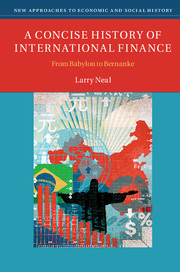Book contents
- Frontmatter
- Contents
- List of figures
- List of boxes
- List of tables
- Preface
- 1 Introduction
- 2 Distant beginnings: the first 3,000 years
- 3 The Italians invent modern finance
- 4 The rise of international financial capitalism: the seventeenth century
- 5 The “Big Bang” of financial capitalism: financing and re-financing the Mississippi and South Sea Companies, 1688–1720
- 6 The rise and spread of financial capitalism, 1720–1789
- 7 Financial innovations during the “birth of the modern,” 1789–1830: a tale of three revolutions
- 8 British recovery and attempts to imitate in the US, France, and Germany, 1825–1850
- 9 Financial globalization takes off: the spread of sterling and the rise of the gold standard, 1848–1879
- 10 The first global financial market and the classical gold standard, 1880–1914
- 11 The Thirty Years War and the disruption of international finance, 1914–1944
- 12 The Bretton Woods era and the re-emergence of global finance, 1945–1973
- 13 From turmoil to the “Great Moderation,” 1973–2007
- 14 The sub-prime crisis and the aftermath, 2007–2014
- References
- Index
4 - The rise of international financial capitalism: the seventeenth century
Published online by Cambridge University Press: 05 October 2015
- Frontmatter
- Contents
- List of figures
- List of boxes
- List of tables
- Preface
- 1 Introduction
- 2 Distant beginnings: the first 3,000 years
- 3 The Italians invent modern finance
- 4 The rise of international financial capitalism: the seventeenth century
- 5 The “Big Bang” of financial capitalism: financing and re-financing the Mississippi and South Sea Companies, 1688–1720
- 6 The rise and spread of financial capitalism, 1720–1789
- 7 Financial innovations during the “birth of the modern,” 1789–1830: a tale of three revolutions
- 8 British recovery and attempts to imitate in the US, France, and Germany, 1825–1850
- 9 Financial globalization takes off: the spread of sterling and the rise of the gold standard, 1848–1879
- 10 The first global financial market and the classical gold standard, 1880–1914
- 11 The Thirty Years War and the disruption of international finance, 1914–1944
- 12 The Bretton Woods era and the re-emergence of global finance, 1945–1973
- 13 From turmoil to the “Great Moderation,” 1973–2007
- 14 The sub-prime crisis and the aftermath, 2007–2014
- References
- Index
Summary
The Eighty Years War between Spain and the Netherlands began in 1568, with resistance by the towns in the Low Countries to the increased taxes levied by Philip II's regent, and then continued off and on until 1648, when the seven northern provinces were recognized as an independent republic in the Treaty of Westphalia (1648). The intensity of the religious conflicts that motivated each side – Philip and his successors as defenders of the Catholic orthodoxy and styled as “Most Catholic Majesties” opposed to Protestants represented by a range of dissenters from pacifist Quakers to assertive Anabaptists – culminated with the Thirty Years War (1618–1648). Under the duress of war finance, the combination of corporate bodies issuing long-term debt and facilitating large-scale transfers of funds across multiple currency borders, a symbiosis that had begun in Italy under papal guidance, now spread into northern Europe. From there, the instruments and organizations for modern international finance would spread across the Atlantic, but with distinctive differences among the European imperial powers and within their colonies in the Americas.
The Thirty Years War completed the financial reorganization of western Europe and laid the basis for the rise of the modern nation-state. In the Treaty of Westphalia, the monarchies of the belligerents recognized the legitimacy of self-governing republics in the United Provinces of the Netherlands and the Helvetian Confederacy of Switzerland. The distraction of Spanish and Austrian rulers from maintaining authority over their overseas possessions allowed the Dutch, English, and French trading enterprises to expand across the Atlantic, making their well-to-do merchants and gentry aware of the possibilities of trade in sugar, tobacco, and slaves while holding out always the allure of possible silver and gold mines, given the Spanish success in Mexico and Peru.
Within the battlefields of central Europe, on the other hand, cities and towns learned to create their own municipal debts by forcing loans from their citizens to pay off the marauding armies who threatened otherwise to burn their wooden walls and dwellings. So-called “brenngeld” became the basis of long-standing municipal debts thereafter known as “Kontributionen,” which were calibrated to the estimated replacement value of the buildings in the city (Redlich 1959).
- Type
- Chapter
- Information
- A Concise History of International FinanceFrom Babylon to Bernanke, pp. 52 - 71Publisher: Cambridge University PressPrint publication year: 2015



